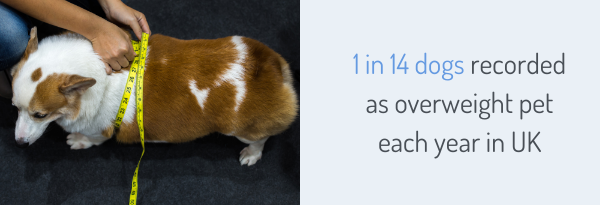Although many dog owners take care of their new pets, provide them with a home and shelter, one problem becoming most common and that is an overweight problem. According to dog obesity statistics, the problem of overweight dogs increases every year, and many dog owners are not informed about the normal weight of their pets.
The problem of being overweight can lead to major health consequences and affect the duration of the dog’s life. Do you know how many dogs have a few kilos more or are obese? Or home weight can affect their health?
We found the newest obesity and overweight statistics, so if you’re interested to find out some of the information that might help you to be a better dog owner, keep on reading.
Top 4 Dog Obesity Statistics
(Editor’s pick)
- Over 50% of adult dogs have problems with weight and obesity.
- About 22 % of dog owners think their dog is not overweight when he actually is.
- Only 15% of dog owners weigh their dogs every month.
- Around 68% of pet owners help their dogs lose weight.
The List Of 9 Interesting Dog Obesity Statistics & Facts
1. Over 50% of adult dogs have problems with weight and obesity
Association for Pet Obesity Prevention revealed that around 53% of adult dogs are overweight or obese, which presents a big problem for an animal.
Overweight dogs can have a lot of health problems such as higher blood pressure, diabetes, arthritis, and develop some diseases as well as cancer. Adult dogs are not that active and can’t run like a young age, but the biggest problem is obviously the amount of food they ate during the day.
Source: dosomething.org
2. About 22 % of dog owners think their dog is not overweight when he actually is
One of the problems with dog owners is that they’re so used to their dogs that sometimes don’t notice or pay attention if the dog is overweight.
According to some dog statistics, about 22% of dog owners didn’t admit their pet is overweight when actually it is. Even if this percentage is not that high, there is still a big number of owners that don’t take care of dogs’ health.
Purina Lifespan study show that obesity can cause a lot of health problems and take almost two years off a pet’s life, which is in human years around 14 years. Dogs are known that can ate a lot, but the owners are those who dictate which amount of food will they get every day.


Source: dosomething.org
3. Dogs between ages 5 and 10 are most common to gain weight
Obesity can happen no matter of dog age, but most commonly is seen in dogs between 5 to 10 years. As they get older they’re less active, if the dog owners don’t go with them on daily walking.
According to dog walking statistics, still many dog owners don’t go for a daily walk with their dog, which is connected with being overweight in some cases. This is mostly a problem with indoor or neutered dogs, they have a higher risk to become obese.
Source: petmd.com
4. Over 50% of pet owners say their veterinarian discussed their dog’s weight
During the annual visit, around 52% of dog owners reported that their veterinarian commented about their dog’s weight, and warn them he is overweight, no matter if it’s about only a few kilos.
Veterinarians will, in those cases, suggest diet or ask about their daily exercise, which can be one of the problems because of weight. Also, veterinarians can monitor the situation during every visit.
Source: todaysveterinarypractice.com
5. Only 15% of dog owners weigh their dogs every month
If the dog has a few kilos more, usually dog owners will not notice it until put it on the scale and it is important to weigh them every month.
Only 15 % of dog owners, according to statistics, weigh their dogs every month. Around 44 % of dog owners do that every few months, which is less than half of the dog owners.
Source: todaysveterinarypractice.com
6. In UK 1 in 14 dogs recorded as overweight pet each year
Royal Veterinary College (RVC) revealed the newest study about the scale of overweight dogs in the UK. The results say that there are 1 in 14 overweight dogs that are recorded by their vets.
The epidemic of overweight dogs became normal as most dog owners are a lot busier than before, and the number of dogs increases every year.


Source: petobesityprevention.org
7. Eight breeds showed an increased risk of obesity compared to mixed breeds
Some of the dog breeds can easier gain weight than others, which can be connected with the dog’s body shape and size.
Pugs and Beagles are on the top of the list of breeds that are prone to gain weight. The rest of the breeds include Golden Retriever, English Springer Spaniel, Border Terrier, Labrador Retriever, Cavalier King Charles Spaniel, and Cocker Spaniel.
The owners of those breeds have also problems with more thefts, according to dog theft statistics. Some dog breeds are easier to catch if they’re overweight, as well.
Source: petobesityprevention.org
8. According to the survey, 40% of dog owners think a grain-free diet is healthy
In 2018., Pet obesity pet owner survey in the US. revealed that around 40% of dog owners think a grain-free diet is healthy, and about 36% don’t know.
Comparing it to the answers from veterinary professionals, around 69% of them think that a grain-free diet for dogs is not healthy. We can assume that most dog owners don’t know the right choice for their dog when it comes to diet.
Source: petobesityprevention.org
9. Around 68% of pet owners help their dogs lose weight
If the veterinarian notice and that the dog is overweight during the monthly or annual visit, it is normal to warn the dog owner about the consequences. Fortunately, around 68% will do something about that and help the dog to lose weight to be healthier.
Some of the best methods include calorie reduction which means smaller portions, as well as increasing exercise if the dog is not too old. Low-fat food and prescription diet from veterinarians is also a good choice if necessary.
Source: petobesityprevention.org
To Sum Up
Summarizing all dog obesity statistics from our article, we can say that a high percentage of dogs are overweight or obese. Overweight dogs have a lot more health problems than dogs of normal weight, and all can lead to much worse problems such as disease or even cancers. Some of the breeds can easier gain weight than other mixed breeds. A strict diet, more exercise, and counting calories are the most effective ways that will help your dog to become healthy and happy.






























Leave a Reply